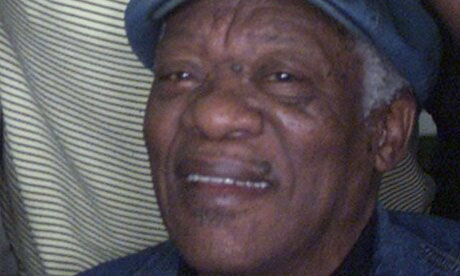
Joe Mogotsi’s band provided a platform for Miriam Makeba and Hugh Masekela Photograph: Getty
Joe Mogotsi, who has died of cancer aged 87, was the singer and lyricist of the Manhattan Brothers, the South African quartet that launchedMiriam Makeba into the big time. He first trod the boards aged five or six, he said, when he featured in a concert by his bandleader father, David. Later, he joined a vocal group in his home town, Pimville, outside Johannesburg.
They played the black townships, but little of the takings filtered down to the singers. Mogotsi and three boys from his school broke away to form the Manhattan Brothers. The quartet was soon in demand over a wide area of the Transvaal. On leaving school in 1938, they widened their horizons, playing 32 villages on a tour of British Bechuanaland (now Botswana).
Their breakthrough came when Alec Delmont, in charge of recruitment for Gallo Africa, the African arm of the Decca record label, heard the brothers singing and tap dancing on a Johannesburg pavement and invited them to audition. The black vocalists and the white session musicians who barely acknowledged their existence were crammed into a stifling studio with a single microphone overhead. It went badly, but Delmont stuck with them. New releases were put on hold during the second world war as Gallo records were still pressed in London, but he found them work in Gallo's guitar factory.
After the war, many black South Africans moved to the cities, acquired sophisticated tastes and had just enough cash to buy a record player and the 78s to spin on them. Stylish and cool in an American way, the Manhattan Brothers were featured in Drum magazine sporting tuxedos and black bow ties, were heard on the radio, and seen in clubs. It was hard work – a typical show ran from 8pm to 4am so that the audience did not break the night curfew imposed on "natives".
The music, though not overtly political, was an expression of African joy and confidence. The songs were from American shows, gospel and spirituals, jazz and swing, but mixed with African choral and Zulu harmonies. The most enduring influence was the prewar American Mills Brothers, rooted in "barbershop" singing. Mogotsi composed most of the new material and also sang the leads. The band provided a platform for stars in the making – the trumpeter Hugh Masekela and the pianist Abdullah Ibrahim. But as they were paid a flat fee for recordings, there were no royalties. They never made a decent profit from the estimated 2-3m records sold by Gallo.
Yet Makeba, who owed her early success to the group, did benefit. In 1956 their song Lovely Lies, with vocals by Makeba, Mogotsi and Nathan Mdledle, became the first South African record in the US Billboard Top 100. Years later, doing well in the US, Makeba accepted royalties for her rendering of several Manhattan creations. Tackled at one point by Mogotsi, Makeba acknowledged the Brothers as composers and lyricists of some of their work, including her trademark Click Song, a traditional number adapted by Mogotsi.
In the 1950s the Manhattan Brothers were southern Africa's undisputed favourites. The Queen Mother heard them at the Rhodes centenary celebrations in Southern Rhodesia (now Zimbabwe) in 1953. By the end of the decade, however, record sales were sagging. The Brothers were rescued by the black musical King Kong, which swept triumphantly through South Africa, then ran for eight months in London in 1961 and toured Britain. Mdledle played the boxer King Kong, and Mogotsi his gangster rival, while Brothers Rufus Khoza and Ronnie Sehume had supporting roles.
The Brothers remained in London, but the euphoria was soon dissipated. One night, topping the bill in Birmingham, the quartet was dismayed to find the white support acts were paid more than them. In the age of the Beatles and the Stones, their offerings were no longer saleable. The quartet broke up, though Mogotsi never stopped composing. He performed rare gigs in London and landed small parts in films.
In 1971 he married the theatre impresario Pearl Connor. They co-wrote a book on the Manhattans, Mantindane: "He Who Survives" (2002). Mogotsi fought, unavailingly, for the release of 60 of the 200 surviving sides recorded by Gallo. The rest had been dumped. In 1990 the Manhattan Brothers were on stage again, harmonising at Wembley Stadium in front of Nelson Mandela, who had known them in the old days.
Pearl died in 2005. Mogotsi is survived by her children, Geraldine and Peter; and by his children, Hazel and Norah, from a previous relationship.
• Joe (Kolie) Mogotsi, singer and songwriter, born 24 April 1924; died 19 May 2011
No comments:
Post a Comment